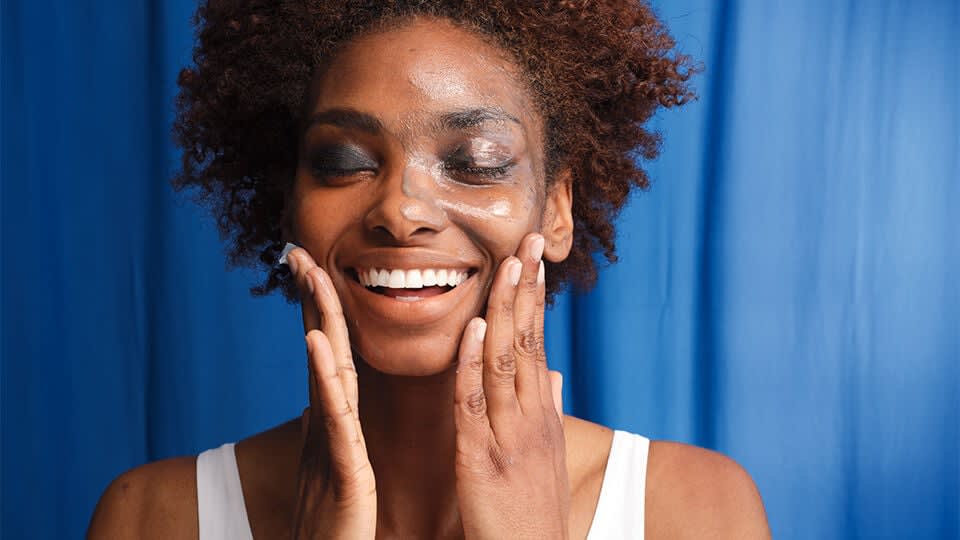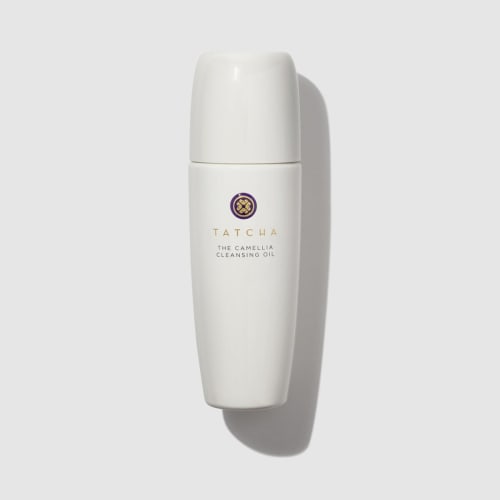The removal of makeup is an essential skincare step. If you have skin that is prone to reaction, however, it can be an opportunity for disaster. Here is how to remove makeup from sensitive skin.

Good skincare routines are built on cleansers, which clear the day’s makeup to make the way for our creams and serums to get to work. Without this first step, all of our other skincare is ineffective. A good cleanse is critical, and not too hard to find.
For those who have sensitive skin, selecting a cleanser is a more complicated task. Sensitive skin is the more common term for reactive skin, characterized by “the occurrence of unpleasant sensations (stinging, burning, pain, pruritus, and tingling sensations) in response to stimuli that normally should not provoke such sensations,” according to a Swedish dermatological journal. In other words, it’s a skin type best left unperturbed.
And yet, it’s a skin type that, like all others, requires regular care to maintain its healthy form and function—as a barrier between you and the outside world. Cleansing is crucial to that care. This is why, regardless of whether your skin type is oily or dry, combination or sensitive, your nightly skincare routine should begin with a proper rinse that removes makeup, dirt, or other accumulated build-up. By selecting the right cleanser, taking into consideration things like texture and ingredients, you should easily be able to create a custom, calming, cleansing ritual for your own skin.
Do I need to wash my face?
Dermatologists agree: Everybody needs to wash their face. Dirt and other build-up collects on our skin as a byproduct of daily life, and it's the job of a cleanser to clear it all away.
Many experts recommend washing your face twice a day, while some dermatologists make a crucial distinction between face washing and face rinsing. The former includes a skincare product formulated to properly cleanse the dermis, while the latter can be done with water alone. Particularly reactive skin types might benefit from rinsing in the morning and saving their true cleanse for before bed but the ideal frequency for each person depends on their skin’s unique composition and goals.
Your nightly cleanse is very important for your overall skin’s health. When you arrive to your evening skincare routine, your face is probably still holding on to the makeup and sunscreen applied earlier in the day. It can be difficult to achieve a complete cleanse with water alone, which is why skincare formulations can help to melt away makeup, dirt, and other substances you don’t want to leave on overnight.
What’s the best way to remove makeup for sensitive skin?
Every face needs to be washed, and every face needs to take off its makeup to do so, but it’s true that some washes can be harsher than others. Those with sensitive skin know this better than anybody else. The American Academy of Dermatology warns against abrasive scrubbing preferring lukewarm water and gentle fingertip massages. They also warn against overwashing, which can further sensitize skin, according to a recent report from Allure, by wearing down your skin’s natural barrier, leading to increased dryness and redness.
This is why so many sensitive skin types like gentle product textures, including creams and oils, that exchange dirt and impurities with nourishing vitamins and necessary hydration. Oils, like The Camellia Cleansing Oil, do a beautiful job of this. The featherweight formula slicks off makeup with ease, without disturbing the skin’s moisture balance. This comes as little surprise: In antiquity, geishas used tsubaki, or camellia oil, when cleansing their own skin of layers of stage makeup.) In a trial conducted by Tatcha, 100% of women who used the Camellia Cleansing Oil also noticed improvements in wrinkles*. A good cleanser should do more than just cleanse; It should improve the quality of your skin overall.
What about sensitive eyes?
Sensitive skin is one thing, but sensitive skin around the eyes is another. As a dermatologist told InStyle, “the skin around the eye area is some of the most delicate and sensitive skin on the body,” even in those without reactive skin. It’s the thinnest part of the dermis on our faces, making the region particularly prone to reactions from products, the sun, or the environment around us.
Of course, the eyes are also some of our favorite makeup canvases, and are often the target of eyeshadows, mascaras, and other paints and pigments. So when it comes time to take it off, it’s wise to choose a cleanser that will minimize the amount of work you have to put in. This is where a balm comes in handy; These oil-based formulas are known to melt away even the most stubborn makeup remnants, and are frequently employed as gentle makeup removers. Tatcha’s Indigo Cleansing Balm, for one, transforms textures on the skin, from a cushiony balm to a silky oil that cleanses skin and removes makeup at the same time. (It’s also made with indigo, a botanical extract prized for its soothing properties — and its gentleness on sensitive skin.)
It might be wise to follow up with a skincare-product approved for optical use, such as an eye cream, that can deliver extra nourishment where your skin needs it most. Bonus points if it has ingredients that help retain hydration, like the white peony and silk extracts found in the Melting Eye Cream that smooth skin and diminish the appearance of fine lines. All in all, having sensitive skin means being choosy about what you put on. Read ingredient labels, talk to your dermatologist, and keep reading about sensitive skin.
And whatever you do, don’t forget to take off your makeup.
*based on a clinical study of 20 women over 4 weeks.




